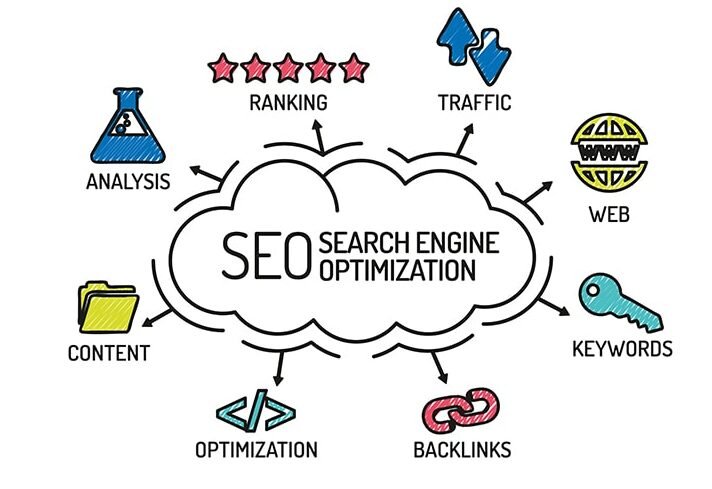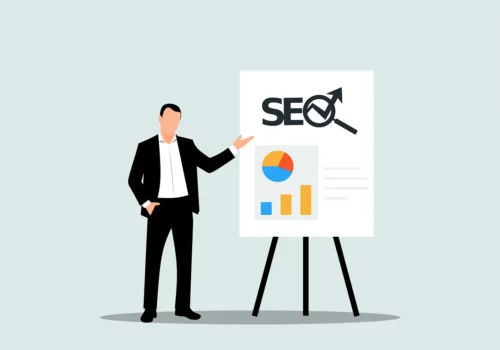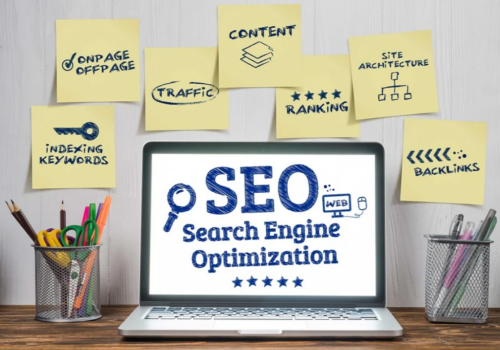Enhance your website’s online presence with expert guidance. Join us today and stand out from the competition.
If you’re excited about having more people discover your site, you’re in the right spot.
This guide is all about easy tips to make your website more visible on search engines. Whether you’re just starting or want to make your site even more popular, Let’s explore simple strategies to help your website shine online.
Get ready to make your website a standout!
11 Tips to Improve SEO Rankings of Your Website
Search engines tend to reward websites that are user-friendly, which means that their usability is high. Google gives preference to sites that not only have a high keyword density but also demonstrate user engagement.
Basically, your SEO ranking improves when visitors stay on your website for longer periods, browse more pages, and return to your website.
Let’s take a closer look at these tips to improve your website’s SEO rankings.

1. Unique, Useful and Relevant Content
Creating highly useful and unique content is the most important thing when it comes to attracting more users to your website.
Merely writing a lengthy post won’t guarantee more readership. Your content must be of high quality and easy to understand by the readers.
When you provide useful content, visitors tend to stay longer on your website, which helps improve your SEO rankings. The word count of your content does not increase your SEO ranking.
It’s all about the quality of your content, keyword stuffing, and incorporating more outbound links that will help improve your SEO ranking.
2. Page Load Speed
Page load speed is crucial for improving your website’s search engine ranking. Both Google and Bing consider page-loading time when determining a website’s ranking.
If your website takes too long to load, users are more likely to leave, resulting in a higher bounce rate and lower page views, which can negatively impact your SEO ranking.
To increase page load speed, you can use cache plugins, ensure clean code, optimize image sizes, minimize redirects, and reduce the number of plugins.
By implementing these strategies, you can improve your website’s load time and ultimately boost your SEO ranking.
3. Image Optimization
Properly optimizing images can help reduce their file size and improve website load speed. Research has shown that using good-quality images can potentially increase conversion rates.
To take advantage of using photos to increase trust and improve your visitors’ experience, it is important to optimize images properly.
This can also increase Click Through Rates without negatively affecting your SEO ranking. However, optimizing images is not just about file format and size.
You should also give each image proper attributes and use relevant keywords for image file names, alt tags, titles, descriptions, and captions. By doing so, you can further improve your website’s SEO.
4. Header Tags
It’s important to format your website content properly to improve the user experience. Using header tags and good formatting will make your content easier to read and understand, which will encourage readers to spend more time on your website.
This will also signal to search engines that your website is relevant. To improve your user experience and SEO rankings, it’s important to use header tags properly.
Search engines tend to give more weight to keywords in header tags, so including relevant terms in your headers can help boost your rankings.
By breaking your content into sections using header tags, you can make it easier for readers to navigate and find the information they’re looking for.
5. Outbound Links
It is important to make your content useful and relevant to your users. However, it is equally important to include outbound links to authority sites that can provide more in-depth information to your users.
By linking to well-respected authority sites, you can improve the relevancy of your content and encourage users to spend more time on your site.
This practice can also help to establish trust with Google and improve your SEO rankings.
However, it is important to use outbound links in moderation, as too many links can be distracting and make your content difficult for users to understand.
Keep the number of outbound links limited to ensure that your content remains user-friendly and easy to navigate.
6. Use Images, Videos, Slideshows and Audio
Incorporating images, videos, slideshows, and audio into your content can make it more user-friendly and deliver information in a way that users will find useful.
The use of different multimedia signals quality content to search engines and can make your content look more attractive and engaging.
Video marketing has become an essential tool for driving user engagement and conversion rates, with websites that use videos achieving 4.8% higher conversion rates.
7. Broken Links
Broken links are one of the most crucial things to avoid on a website. No one wants to click on a link and end up on a 404 page.
Broken links create a bad user experience and search engines consider them as a signal of old and neglected sites, which can impact your SEO rankings.
However, you don’t have to manually check every page of your website to find broken links. You can use a broken links checker tool to easily identify them.
So, make sure to check your website for broken links using such tools.
8. Layout and Formatting
Proper formatting and a good layout can significantly enhance the user experience of your website. It makes your content easy to understand and encourages readers to stay on your site for longer.
Good formatting can also improve your website’s SEO rankings.
To improve your website’s usability, use easy-to-read fonts and typography. Bold type and colors can make your content more attractive and encourage users to read it.
Short paragraphs and ample line spacing make the content easy to digest. Use bullets or numbered lists for clarity.
To organize your content and increase interactivity, use techniques like sidebars, tabs, progressive layouts, modal windows, rollover elements, and mega drop-down menus.
These features can help make your website more user-friendly and accessible to readers.
9. Mobile Optimization
It’s crucial to have mobile optimization if you want to rank well on search engines. Google began penalizing sites that aren’t mobile-friendly in April 2015 by reducing their search engine rankings.
With so many people using smartphones, it’s important to ensure that your website is mobile-friendly. If your site isn’t mobile-optimized, you’ll lose potential customers, and it will affect your user experience and conversions.
Consider using Accelerated Mobile Pages (AMP) on every part of your site where it’s necessary.
10. Social Sharing
It is a fact that having a significant number of Facebook shares, Tweets, and Pinterest pins can greatly improve the SEO ranking of your website.
By installing social sharing buttons on your website, you can make it easier for users to share your content, which will not only enhance their experience but also increase your search engine results ranking.
Moreover, social sharing has the potential to drive purchasing behavior.
When users share your post, it will receive more exposure and attract more potential visitors to your website, which can ultimately lead to higher conversion rates.
11. Site Architect and Navigation
When visitors can’t find what they’re looking for on a website, they’re likely to leave, which increases the bounce rate. This can have a negative impact on the website’s SEO rankings and result in fewer page views.
However, a well-planned site architecture with clear navigation can help visitors find what they need.
If visitors find relevant information on the website, they’re more likely to return, and repeat views can improve the website’s SEO ranking.
FAQs
🤔 What is SEO, and why is it important for my website?
SEO stands for Search Engine Optimization. It's crucial for your website because it helps it rank higher on search engine results, making it more visible to users. Increased visibility often translates to more traffic and potential customers.
🔍 How can I choose the right keywords for my website?
Research relevant keywords using tools like Google Keyword Planner. Focus on keywords that align with your content and are commonly searched by your target audience.
✅ Is content quality more important than quantity for SEO?
Yes, quality outweighs quantity. Search engines prioritize valuable, relevant, and well-written content. Aim for content that addresses user needs and provides a positive experience.
🔥Should I use backlinks to improve SEO?
Yes, backlinks are essential. They signal to search engines that your content is reputable. Focus on acquiring high-quality, relevant backlinks from reputable sources.
👉 Do social media signals impact SEO rankings?
While social media signals don't directly impact rankings, social shares can increase your content's visibility. A strong social presence can indirectly contribute to SEO success.
🚀 Is website speed a crucial factor for SEO?
Yes, it is. Fast-loading websites provide a better user experience, and search engines prefer ranking sites that load quickly. Optimize images, use browser caching, and choose a reliable hosting provider to enhance speed.
You may also like:
- How Google RankBrain Algorithm Changed the Course of SEO
- The Ultimate Guide To Bing Webmaster Tools For SEO 2024
- Easy Guide To On-Page SEO Optimization For WordPress (SEO 2024)
- [Latest] Best WordPress SEO Plugin and Tools That You Should Use in 2024
Conclusion: Improve SEO Rankings in 2024
Now, you have top-notch tips to improve your website’s SEO rankings. By practicing them efficiently, you can easily enhance the SEO rankings of your site and blogs.
The more user-friendly your site is, the higher the probability of getting a higher rank. Always ensure proper SEO optimization of the content on your website and follow all of the above tips.
If you have more tips to share that can help improve SEO rankings, feel free to add them in the comments section.
Also, don’t forget to share this post on all trending social media platforms. I hope this post serves your purpose well.











